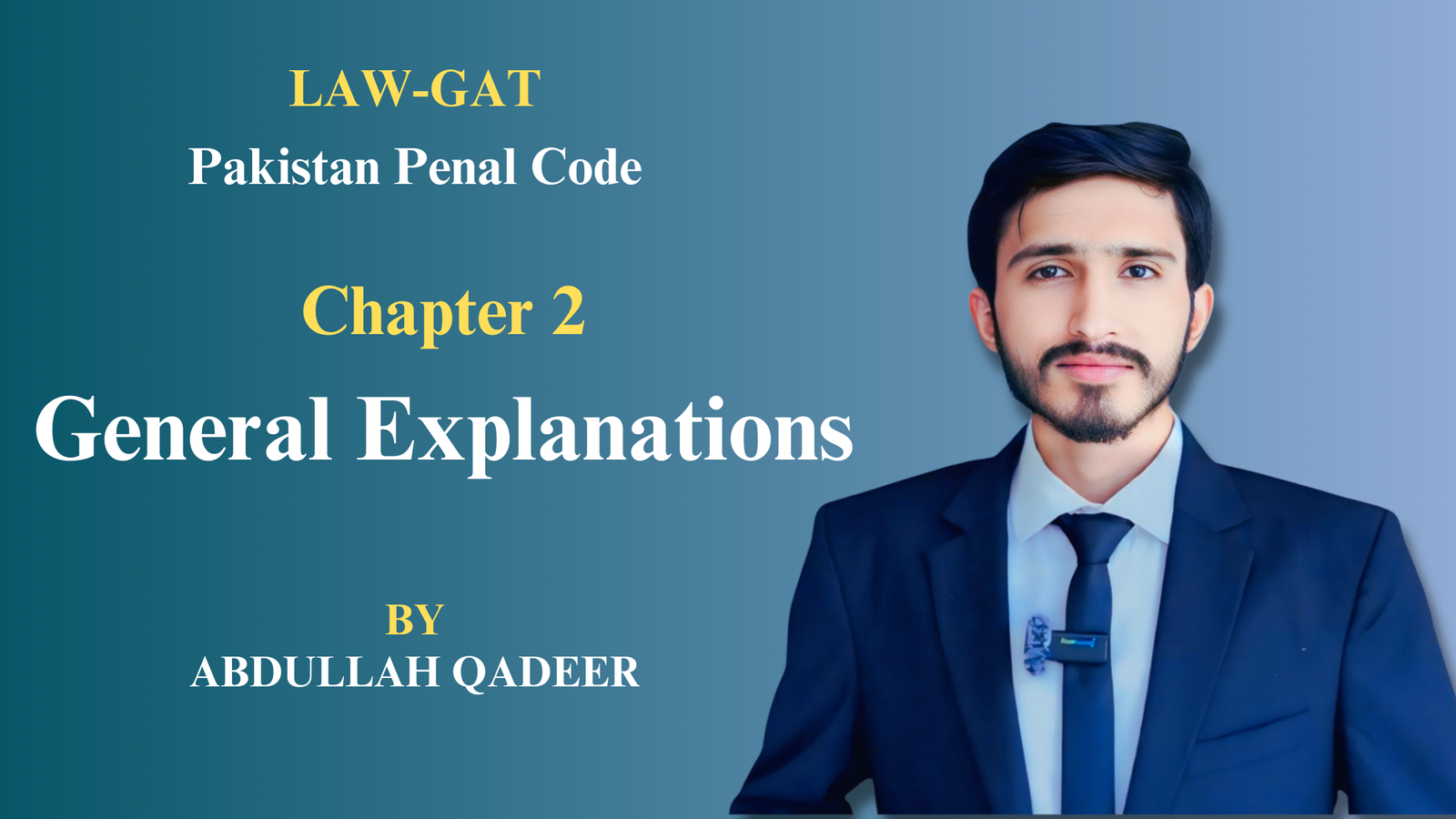The Pakistan Penal Code (PPC), enacted in 1860, serves as the backbone of the criminal legal system in Pakistan. Originally drafted during British colonial rule, it continues to provide the comprehensive legal framework for defining and penalizing criminal offenses in the country.
The Code is divided into various chapters, each addressing specific crimes such as offenses against the state, human body, property, and public tranquillity. For aspiring legal professionals preparing for the LAW GAT exam, a thorough understanding of each chapter and the ability to interpret its provisions and applications is essential. This series aims to present key concepts, important sections, and MCQs from each chapter of the PPC in a clear and exam-focused manner.
Important Multiple Choice Questions
- Definitions in the Pakistan Penal Code, 1860, are understood subject to which chapter?
A. General Explanations
B. General Exceptions
C. Introduction
D. Offences
Answer: B - Expressions explained in any part of the Pakistan Penal Code, 1860, are used how?
A. Consistently throughout the Code
B. Only in the chapters where they appear
C. Differently depending on interpretation
D. Based on context-specific revisions
Answer: A - In the Pakistan Penal Code, 1860, the pronoun “he” includes which gender(s)?
A. Male only
B. Female only
C. Both male and female
D. Neither male nor female
Answer: C - Words importing the singular number in the Pakistan Penal Code, 1860, include:
A. Only the singular
B. Only the plural
C. Both singular and plural, unless otherwise specified
D. None of the above
Answer: C - The term “person” in the Pakistan Penal Code, 1860, includes:
A. Only natural persons
B. Companies, associations, or bodies of persons, whether incorporated or not
C. Only public officials
D. Individuals related to the state
Answer: B - Who does the word “public” refer to in the Pakistan Penal Code, 1860?
A. Only registered communities
B. Any class of the public or a community
C. A group of public officials
D. Local government bodies only
Answer: B - What is meant by “dishonestly” in the Pakistan Penal Code, 1860?
A. Causing wrongful loss to one person or wrongful gain to another
B. Acting without integrity
C. Intending to breach civil contracts
D. None of the above
Answer: A - Under the Pakistan Penal Code, 1860, what does “fraudulently” mean?
A. Acting without honesty
B. Acting with the intent to deceive for financial gain
C. Acting with the intent to defraud
D. Misusing public authority
Answer: C - In the Pakistan Penal Code, 1860, property in the possession of a servant or clerk is regarded as:
A. The servant’s or clerk’s property
B. The employer’s property
C. Joint property
D. Not defined in the Code
Answer: B - What does “document” refer to in the Pakistan Penal Code, 1860?
A. Physical records only
B. Only handwritten notes
C. Any matter expressed or described upon a substance with the intent to be used as evidence
D. Official government records only
Answer: C - The term “valuable security” in the Pakistan Penal Code, 1860, refers to:
A. A document acknowledging legal liability or transferring legal rights
B. Tangible assets like money or gold
C. Physical securities issued by the government
D. None of the above
Answer: A - Illegal omissions in the Pakistan Penal Code, 1860, are treated as:
A. Independent actions
B. Acts only when expressly stated
C. Equivalent to acts, unless otherwise specified
D. Minor violations
Answer: C - A criminal act done in furtherance of common intention makes:
A. Only the main perpetrator liable
B. All participants liable in the same manner
C. Only accomplices liable
D. None of the above
Answer: B - In the Pakistan Penal Code, 1860, a person is said to act “voluntarily” when:
A. They act without external influence
B. They cause an effect with intention or knowledge of its likely occurrence
C. They are coerced to act
D. Their action is accidental
Answer: B - What does the term “offence” generally mean under the Pakistan Penal Code, 1860?
A. Any immoral act
B. An act punishable under the Code
C. Violations of social norms
D. Any civil wrong
Answer: B - What does “special law” mean in the Pakistan Penal Code, 1860?
A. A law applicable to a particular subject
B. A law for specific regions only
C. A universally applicable law
D. An outdated legal provision
Answer: A - The term “local law” in the Pakistan Penal Code, 1860, applies to:
A. Entire Pakistan
B. A specific part of the country
C. Specific groups of people
D. Municipal ordinances
Answer: B - The term “injury” in the Pakistan Penal Code, 1860, denotes harm caused to:
A. Only a person’s body
B. Only property
C. Body, mind, reputation, or property
D. Any living organism
Answer: C - In the Pakistan Penal Code, 1860, what is the meaning of “life”?
A. The life of a human being
B. Any form of life, including animals
C. The span of an individual’s existence
D. A philosophical concept
Answer: A - The term “good faith” under the Pakistan Penal Code, 1860, means:
A. Acting with moral intent
B. Acting with due care and attention
C. Acting without negligence
D. Acting with lawful authority
Answer: B

